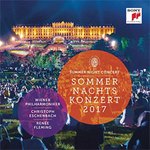|
Back
10/10/2017
“Sommernachtskonzert”
Antonín Dvorák: Carnival Overture, opus 92 – Armida, opus 115: “As I Merrily Pursued a Gazelle” – Rusalka, opus 114: “Song to the Moon”
Pyotr Ilyich Tchaikovsky: The Sleeping Beauty Ballet Suite, opus 66a
Sergei Rachmaninoff: ”Twilight” and “Spring Waters” (arr. W. Mnatsakanov) – “Never Sing to Me Again, Beautiful Maiden” (arr. L. Leonardi)
Engelbert Humperdinck: Hänsel und Gretel: “Prelude”
John Williams: Harry Potter (soundtrack): “Hedwig’s Theme”
Igor Stravinsky: The Firebird Ballet Suite (1919 version): “Infernal Dance of King Kashchei” – “Berceuse” – “Finale”
Bedrich Smetana: The Bartered Bride: “Dance of the Comedians”
Renée Fleming (soprano), Vienna Philharmonic, Christoph Eschenbach (conductor)
Live recording: Schloss Schönbrunn, Vienna, Austria (May 25, 2017) – 73’04
Sony #88985425932 – Booklet in English, German and French

   
Now in its 14th year, Sommernachtskonzert is quite the outdoor event, using iconic Schönbrunn Palace as the orchestral backdrop. Each year brings a fresh face to the podium, but in this case, Christoph Eschenbach returns for a second appearance since debuting in 2014.
This year’s theme, “Fairytales and Myths”, contains a roster of magical delight that’s sure to please the young and old. While talented Renée Fleming sings Dvorák and Rachmaninoff selections, there’s pause to reflect regarding tempos for particular pieces. Maestro Eschenbach has not been without controversy surrounding his stint with the Philadelphia Orchestra. Back in 2004 M. Eschenbach was quoted, “I prefer to have flexible tempos and not be fixed. Quicker tempos tend to court superficiality." Perhaps the idea of “quicker tempos” hastening superficiality helps explain why some compositions are a bit jejune.
It’s worthy to first look at the positive qualities. Teldex Studio Berlin’s grasp of sound capture reaches both ends of the fortissimo/pianissimo spectrum in stellar fashion (note the exceptional decrescendo inside the “Berceuse.”) Secondly, M. Eschenbach is justified in using a more methodic and deliberate pace to squeeze out nuances of a composer’s work, as it is found within the lovely rendition of Humperdinck’s “Prelude”, Ms. Fleming’s poignant aria from Armida and all Rachmaninoff songs. Renée Fleming’s vocalizations are on another plane, never ceasing to impress and caress listeners’ hearts through her richly imbued timbre: there is power, there is soul and there is tenderness in every song she sings.
More ambitious tempos are unleashed upon hearing an introductory celesta that help pave the way to unblemished cinematic awe during John Williams’ “Hedwig’s Theme.” There’s also a modicum of even, relentlessly clean detail hovering over Stravinsky’s “Infernal Dance of King Kashchei.” Likewise, the Carnival Overture is the season’s introductory eye-opener with an equally brisk tempo.
Now we turn to the question marks. Indeed, Rusalka’s “Song to the Moon” should be sung with pensive and passionate infusions, yet the maestro cloyingly moves Dvorák’s music forward. Perhaps it’s to give wide berth to Ms. Fleming since this is one of her most delectable showcase arias, and she “owns” it. The same notion applies to Tchaikovsky’s two selections from The Sleeping Beauty as it borders on the boundary of molasses-like frippery while the over-arching of the Firebird’s “Finale” makes it difficult to see the finish line. In a final thought, the encore, “Dance of the Comedians”, has sufficient steam, yet more fluid legato permeates the orchestra while short on punctuated staccatos which would make Smetana’s reading truly vivace.
There’s a lot going for this Sony release; however, pondering notes excessively to “savor the moment” doesn’t necessarily fit the bill.
Christie Grimstad
|